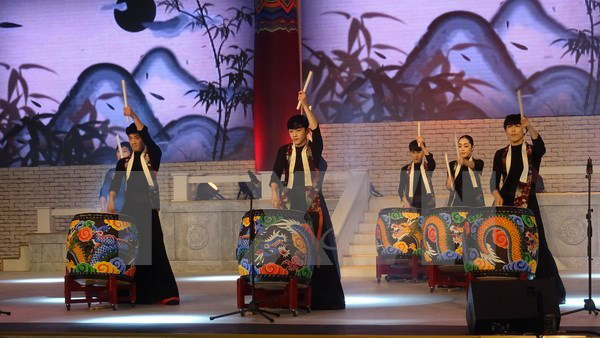
A festival themed "Colours of Daegu City” opened in the evening of November 12 as part of the Ho Chi Minh City-Gyeongju World Culture Expo 2017.

(Photo: VNA)
Hundreds of visitors were
entertained with artistic and cultural performances by artists from the
Republic of Korea (RoK)’s city and students of the Keimyung University.
Speaking at the event, Vice Chairman of the HCM City People’s Committee Le
Thanh Liem said his city and Daegu set up cooperative and friendship ties in
2015, with encouraging outcomes recorded so far.
He expressed his belief that the two cities will see more cooperation
opportunities in the future, adding that mutual understanding between their
people will be boosted via cultural and trade exchanges.
Kwon Young Jin, Mayor of Daegu, said Daegu is a "city of culture and art.”
Based on the basis of the established bilateral ties between Daegu and HCM
City, their people will become closer through cultural and artistic activities.
Daegu is one of the largest cities in the Republic of Korea, only behind the
capital city of Seoul, Busan and Incheon.
Source: VNA
With an increasingly vibrant and widespread emulation movement aimed at building cultured residential areas and cultured families, Yen Thuy District has been making steady progress toward improving both the material and spiritual well-being of its people, while fostering a civilized, prosperous, beautiful, and progressive community.
Once lacking recreational spaces and community facilities, Residential Group 2 in Quynh Lam Ward (Hoa Binh City) has recently received attention for the construction of a new, spacious, and fully equipped cultural house. The project followed the model of state support combined with public contributions in both labor and funding.
The "All people unite to build cultural life" movement, which has been effectively integrated with Kim Boi district’s socio-economic development goals, is fostering a lively spirit of emulation across local residential areas, hamlets, villages, public agencies, and enterprises. In addition, through the initiative, traditional cultural values are being preserved and promoted, while community solidarity and mutual support in poverty reduction and economic development are being strengthened.
A working delegation of the Hoa Binh provincial People’s Committee led by its Permanent Vice Chairman Nguyen Van Toan on June 11 inspected the progress of a project to build the Mo Muong Cultural Heritage Conservation Space linked to tourism services in Hop Phong commune, Cao Phong district.
Born and growing in the heroic land of Muong Dong, Dinh Thi Kieu Dung, a resident in Bo town of Kim Boi district, in her childhood was nurtured by the sweet lullabies of her grandmother and mother. These melodies deeply imprinted on her soul, becoming an inseparable part of her love for her ethnic group's culture. For over 20 years, this love for her hometown has driven Dung to research, collect, and pass down the cultural values of the Muong people to future generations.
In the final days of May, the Ethnic Art Troupe of Hoa Binh Province organized performances to serve the people in remote, mountainous, and particularly disadvantaged areas within the province. These were not just ordinary artistic shows, but they were the meaningful journeys aimed at spreading cultural values, enhancing the spiritual life of the people and contributing to the preservation of ethnic minority cultural identities.



